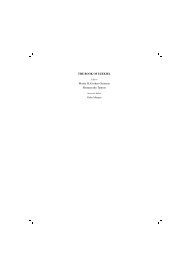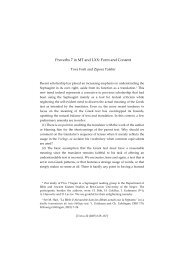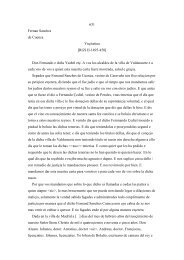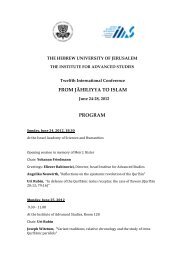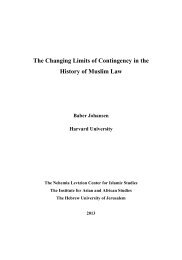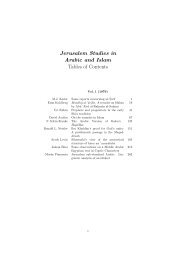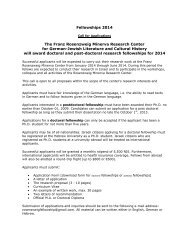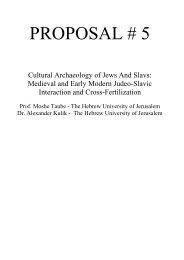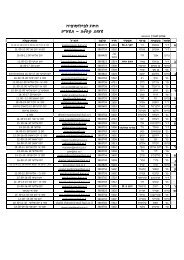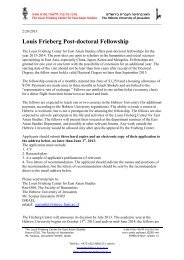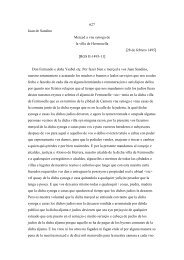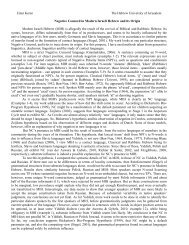Proverbs 7 in MT and LXX: Form and Content
Proverbs 7 in MT and LXX: Form and Content
Proverbs 7 in MT and LXX: Form and Content
You also want an ePaper? Increase the reach of your titles
YUMPU automatically turns print PDFs into web optimized ePapers that Google loves.
142<br />
Tova Forti <strong>and</strong> Zipora Talshir<br />
The Argument—A witness monologue remodeled (Verses 6–20)<br />
The ma<strong>in</strong> body of Prov 7 is constructed as a witness monologue, <strong>in</strong> which<br />
the wisdom-teacher shares with his listeners an experience whose lesson is<br />
the goal of his communication. This literary device renders the lesson more<br />
credible, <strong>and</strong> evokes the audience’s <strong>in</strong>volvement <strong>and</strong> read<strong>in</strong>ess to listen <strong>and</strong><br />
accept. 29 Witness monologues appear occasionally <strong>in</strong> wisdom-oriented<br />
compositions. Thus, the author of Ps 37 adds his own experience <strong>in</strong> order to<br />
emphasize his teach<strong>in</strong>g: “I have been young <strong>and</strong> am now old, but I have<br />
never seen a righteous man ab<strong>and</strong>oned, or his children seek<strong>in</strong>g bread”<br />
(v. 25); “I saw a wicked man, powerful, well-rooted like a robust native tree.<br />
Suddenly he vanished <strong>and</strong> was gone; I sought him, but he was not to be<br />
found” (vv. 35–36). The entire teach<strong>in</strong>g of Qoheleth is anchored <strong>in</strong> his<br />
personal deductions from his own experience, expressed <strong>in</strong> different ways,<br />
for example, by the repeatedly used <strong>in</strong>troduction: “I said to myself...” (e.g.,<br />
Qoh 2:1). In Prov 4:3–4 the wisdom-teacher evokes empathy <strong>in</strong> his ‘son’ by<br />
anchor<strong>in</strong>g his teach<strong>in</strong>g <strong>in</strong> the way he himself was coached: “Once I was a<br />
son to my father, the tender darl<strong>in</strong>g of my mother. He <strong>in</strong>structed me <strong>and</strong><br />
said to me...”. 30<br />
Witness monologues are not common <strong>in</strong> <strong>Proverbs</strong>. In fact, there are only<br />
two examples <strong>in</strong> which the wisdom-teacher makes <strong>in</strong>genious use of this<br />
literary device, elaborat<strong>in</strong>g at length on an <strong>in</strong>cident he experienced: 31 the<br />
elaborate speech under discussion (7:6–20), <strong>and</strong> the short but<br />
<strong>in</strong>tense communication on the sluggard <strong>in</strong> 24:30–34. Interest<strong>in</strong>gly, both of<br />
29 See McKane, <strong>Proverbs</strong>, 572; R.E. Murphy, <strong>Proverbs</strong> (WBC; Nashville, 1998) 186;<br />
C.A. Briggs <strong>and</strong> E.G. Briggs, The Book of Psalms (2 vols.; ICC; Ed<strong>in</strong>burgh, 1906) 1:329.<br />
30 See Ben Sira’s nostalgic monologue on his own learn<strong>in</strong>g <strong>in</strong> his youth (Sir<br />
51:13–22).<br />
31 Saadia Gaon def<strong>in</strong>es these cases as allegories: ‘The wisdom-teacher forwards<br />
allegories <strong>and</strong> articulates them as events that really took place’; Saadia Gaon,<br />
<strong>Proverbs</strong> (ed. Y. Kafih; Jerusalem, 1976) 69–70 (Heb., translated from Arabic). In the<br />
<strong>in</strong>troduction, 15–16, he mentions Prov 7 <strong>and</strong> 24:30–32 together with Qoh 9:14–15 as<br />
examples for such allegories. See Fox, <strong>Proverbs</strong>, 241.



